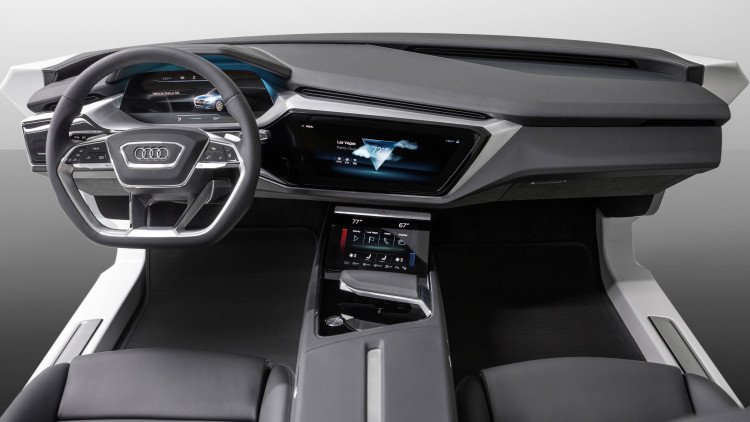While this interior mockup is pulled from Audi's recent E-Tron Quattro concept, our man on the ground at CES was told this is "very close" to the interior we'll see in the next Audi A8, which is due in a year or so.
Virtual Dashboard is screen-heavy in stark contrast to Virtual Cockpit's single, driver-focussed gauge display. It keeps that and adds a pair of screens to the mix, all of them using OLED (organic light-emitting diode) tech. The central screen measures 14.1 inches diagonally and is curved with a rhomboid border; its AMOLED (active matrix organic light-emitting diode) allows for the irregular shape and curvature. Below that sits a more normal, rectangular screen; both are very well integrated into their surroundings. And as in many current Audis, the shift lever acts as a comfy wrist rest.
On the top screen, drivers and passengers get what Audi calls classic information – navigation, audio, settings. The lower screen provides big favorite buttons and also houses on-screen buttons for the climate control. When it's called for, the lower display turns into an input tablet for handwritten entries, an evolution of the small separate touchpad offered in current Audis. The displays use swiping and other gestures familiar to smartphone users, which allow them to interact with each other, for example when swiping to accept a call and move its info to the gauge display.
he screens provide haptic feedback that goes beyond what automakers are offering today. Our man at CES says button presses only result from deliberate presses of the screen, meaning you can rest a finger over your selection and it won't activate until you press, just like a real button. Novel. The steering-wheel controls also provide haptic feedback and have been simplified compared to what's on Virtual Cockpit today.
When it hits production in the A8 and other vehicles, all of this will be built on the next generation of Audi's infotainment platform, which it's creatively calling MIB2+. It offers more computing power than the current MIB2 system, allowing it to run more displays and offer more connected services over an LTE connection. Although Audi hasn't confirmed it, this may be where its recently announced future use of Qualcomm's Snapdragon 602A processor, or possibly the Snapdragon 820A, which was just unveiled at this year's CES.




